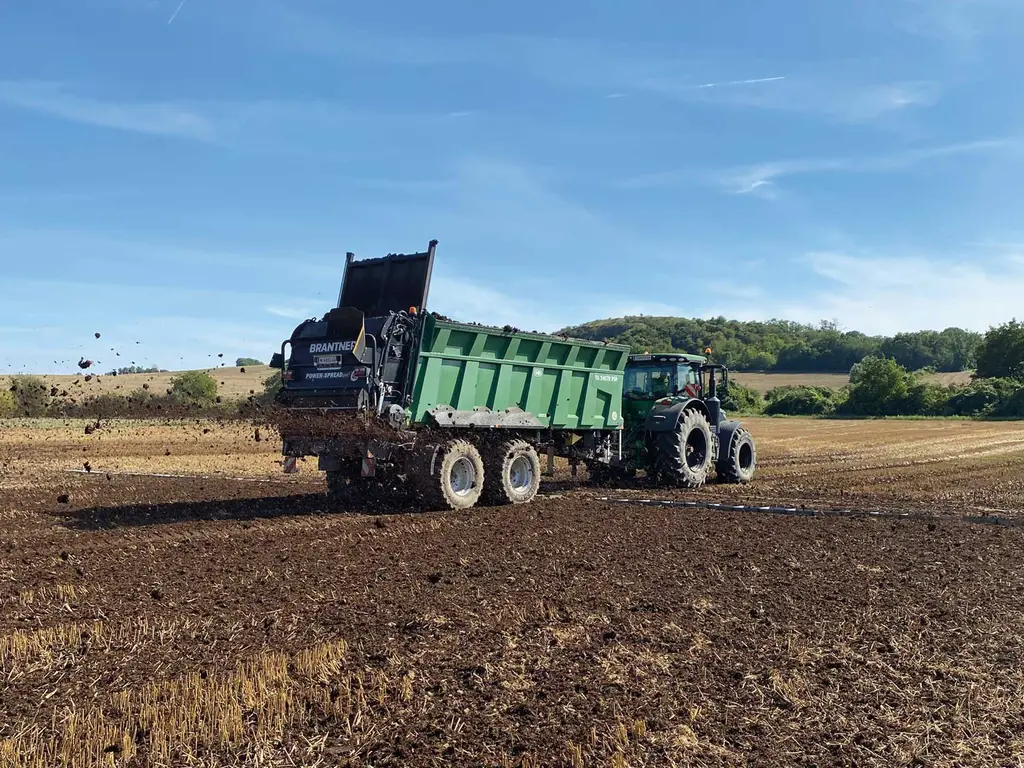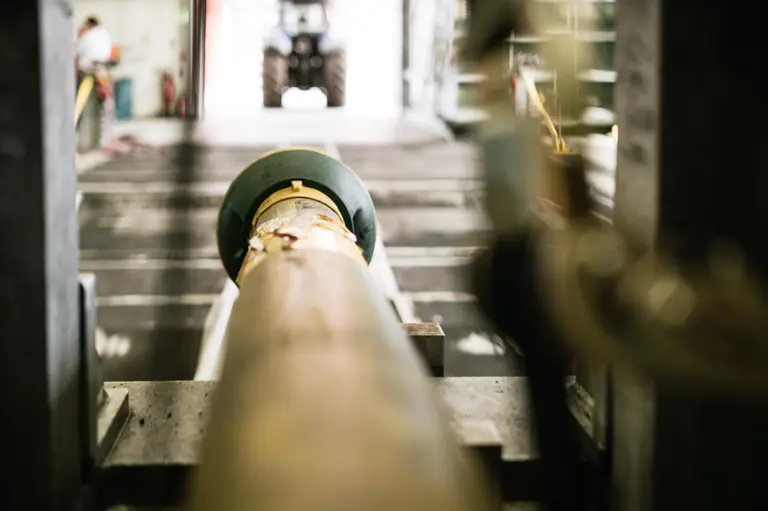Download print version
Test report 6439
The approval
A quality mark “DLG-APPROVED FULL TEST“ is awarded to agricultural products which passed DLG’s comprehensive usability test according to independent and approved evaluation criteria. The product’s most important criteria from the farmer’s point of view are evaluated during this test. The test includes investigations on test benches and under various operating conditions and furthermore, the tested item must prove itself during a practical testing on a farm. The test conditions and procedures are fixed in a test framework which is developed by an independent test commission and adjusted regularly according to accepted rules of engineering as well as to latest scientific and agricultural knowledge and requirements. The successful test concludes with the publication of a test report as well as with the award of the quality mark, being valid for five years after the award.
The DLG Appoved Test “Acid resistance, Joint evaluation” includes measurements in the lab of the DLG Test Center and examinations in practice. The acid resistance was measured and joint evaluation was carried out. The test was based on the DLG Testing Framework for elastic stable flooring, as of April 2010.
The test was based on the DLG Testing Framework for elastic stable flooring, as of April 2010.
Assessment – brief summary
The Blister sandbedmat tested here, a system for building a resting area in cubicles in cubicle houses, was tested as a system with a rubbermat filled with sand and organic litter with regard to durability and comfort properties. The the acid resistance was measured and joint evaluation was carried out. The joint evaluation was clearly better than the standard.
Table 1: Overview of results
| Test characteristic | Test result | Evaluation |
| Acid resistance* | ||
| Feed acid mixture | resistant | + |
| Uric acid | resistant | + |
| Sulfurous acid | resistant | + |
| Ammonia solution | resistant | + |
| Disinfection liquid | resistant | + |
| Peracetic acid | resistant | + |
| Joint evaluation** | no alteration 96,4 % | + + |
* Evaluation range: + = resistant; ◯ = imited resisitant; – = not resisitant** Evaluation range: + + / + / ◯ / – / – – (◯ = standard)
The product
Description and technical data
The Blister sandbedmat tested here, is a system for building a lying area in cubicle barns for cows and cattle.
- Black Rubber sandbedmat with 35 quadratic chambers ca. 20 x 20 cm, which are filled with sand. The surface of the sandbedmat should be interspersed with ca. 5 cm straw litter.
- Dimensions: length 154 cm, width 114 cm, high 11 cm
- weight 50 kg each mat
- Shore A: 75
- The sanbedmats are fixed with 13 screws plus disks and dowel on the anchoring supports on the floor.
The method
Acid resistance
A permanent dipping test in accordance to DIN EN ISO 175:2000 (performance of synthetic material against liquid chemicals) was carried out. Test samples (size 30 mm x 30 mm) were completely dipped into different test liquids for 24 hours and 28 days (room temperature 20° Celsius). In the 28 days test the liquids were changed weekly. After the 28 days the samples were washed with distillate water and dried for 24 hours. Before and after the dipping the weight, the dimensions and the shore hardness (shore A) of the test samples were measured.
Additional visual evaluation was done for alterations like colour changing, swelling, destruction or crystallisation. All samples were evaluated in comparison to the standard water.
Joint evaluation
On three farms which had installed only the tested sandbedmat, cows were examined for externally visible damage in the joint area as of the second third of lactation (joint evaluation).
Evaluation comprised the left and right half of the body and focused on the 10 spots exposed during resting (cf. figure 6). Joint evaluation was always carried out by the same person at the end of the winter feeding period. The results were classified according to the following scheme (table 2).
Table 2: Classification of the joint evaluation
| Result | Classification |
| without any particular result | no alterations |
| hairless spots < 2 cm | small alterations |
| hairless spots > 2 cm | small alterations |
| skin abrasions < 2 cm | medium alterations |
| skin abrasions > 2 cm | medium alterations |
| increased circumference in the bursal area, covered | medium alterations |
| increased circumference in the bursal area, open | great alterations |
| joint participation | great alterations |
The test results in detail
Acid resistance
The material of the sandbedmat was resistant to the tested media. The sandbedmat mat appears to be suitable for the described purpose as it exhibits material resistance to the tested media.
Joint evaluation
On three farms which had installed only the tested cow mattress, a total of 105 cows were examined for externally visible damage in the joint area as of the second third of lactation (joint evaluation). Evaluation comprised the left and right half of the body and focused on the 10 spots exposed during resting. Joint evaluation was always carried out by the same person. In two farms straw litter was used on the Blister sandbedmat. On one farm pellets made of husk were used as litter.
The percentage of the results found in the 105 animals examined is shown in figure 7. 96.4 % of the spots evaluated did not show any pathological result. Great alterations, like increased circumference in the bursal area, open joint participation were not found.
Small alterations, such as hairless spots were found at 2.6 % of the spots evaluated. At 1.0 % of the spots evaluated medium alterations, such as skin abrasions and increased circumference in the bursal area (covered) at the joints were found. The pathological results determined were mainly found in the tarsal joint. Only in a few cases were pathological results found in the ankles ort the carpal joint.
Table 3: Test liquids and results – acid resistance
| Test liquid | Concentration | Result after 24 hours residence time | Result after 28 days residence time | Evaluation |
| Feed acid mixture | concentrate, pH 2 | no changing | no changing | resistant |
| Excrement acids | ||||
| Uric acid | saturated urea solution (0,4%) | no changing | no changing | resistant |
| Sulfurous acid | 5-6% SO2 | no changing | no changing | resistant |
| Ammonia solution | 32 % solution | no changing | resistant | |
| Disinfection liquid | ||||
| Barn Disinfection liquid | 2 %-solution of a product with formic acid and glyoxyl acid | no changing | no changing | resistant |
| Peracetic acid | 3000 ppm | no changing | no changing | resistant |
Based on test-stand investigations, the criteria tested in this DLG Approved Test evaluate the comfort and durability properties of the Blister sandbedmat for use in the resting area of high cubicles in cubicle houses. The tested Blister sandbedmat met the requirements of the testing framework with respect to the investigated criteria.
Manufacturer and applicant
New Farms s.r.l.,
Via Visano Nr. 2,
I-25010 Remedello (BS)
www.newfarms.it
Test performed by
DLG e.V.,
Testzentrum Technik und Betriebsmittel,
Max-Eyth-Weg 1,
64823 Groß-Umstadt
DLG test scope
DLG Approved Test “Elastic Stable Flooring” (as at 04/2010)
Area of expertise
Indoor operations
Head of Department
Graduate engineer. agr. Susanne Gäckler
Test engineer(s)
Dr. Harald Reubold *
* Author
Contact us
DLG TestService GmbH - Groß-Umstadt location • Max-Eyth-Weg 1 • 64823 Groß-Umstadt • Tel: +49 69 24 788-600 • tech@DLG.org




















